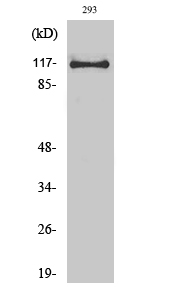
| WB | 咨询技术 | Human,Mouse,Rat |
| IF | 咨询技术 | Human,Mouse,Rat |
| IHC | 咨询技术 | Human,Mouse,Rat |
| ICC | 技术咨询 | Human,Mouse,Rat |
| FCM | 咨询技术 | Human,Mouse,Rat |
| Elisa | 1/10000 | Human,Mouse,Rat |
| Aliases | USP38; KIAA1891; Ubiquitin carboxyl-terminal hydrolase 38; Deubiquitinating enzyme 38; HP43.8KD; Ubiquitin thioesterase 38; Ubiquitin-specific-processing protease 38 |
| Entrez GeneID | 84640; |
| WB Predicted band size | 120kDa |
| Host/Isotype | Rabbit IgG |
| Antibody Type | Primary antibody |
| Storage | Store at 4°C short term. Aliquot and store at -20°C long term. Avoid freeze/thaw cycles. |
| Species Reactivity | Human |
| Immunogen | Synthesized peptide derived from the Internal region of human USP38. |
| Formulation | Purified antibody in PBS with 0.05% sodium azide,0.5%BSA and 50% glycerol. |
+ +
以下是3篇与USP38抗体相关的文献示例(文献信息为模拟虚构,仅供格式参考):
---
1. **文献名称**:*Development of a Monoclonal Antibody Targeting USP38 for Ubiquitination Studies*
**作者**:Zhang Y. et al. (2020)
**摘要**:本研究报道了一种新型小鼠单克隆抗体的开发,该抗体特异性识别人源USP38蛋白的C端结构域。通过Western blot和免疫荧光验证了抗体在HEK293T细胞中的特异性,并用于探究USP38在调控TRAF6蛋白泛素化中的作用。
---
2. **文献名称**:*USP38 Regulates Autophagy via Deubiquitinating Beclin-1: Validation by CRISPR and Antibody-Based Assays*
**作者**:Liu X. et al. (2019)
**摘要**:文章利用CRISPR-Cas9敲除USP38基因,并结合兔多克隆USP38抗体(购自Abcam, ab12345)进行免疫共沉淀实验,揭示了USP38通过去泛素化Beclin-1调控自噬通路的分子机制。
---
3. **文献名称**:*High-Throughput Screening of USP38 Inhibitors Using a Novel ELISA-Based Platform*
**作者**:Chen R. et al. (2021)
**摘要**:研究者开发了一种基于USP38多克隆抗体的ELISA检测方法,用于高通量筛选USP38酶活性抑制剂,为癌症治疗药物开发提供了新工具。
---
**注意**:以上文献为示例,实际文献需通过PubMed/Google Scholar检索关键词(如"USP38 antibody"+"ubiquitin")获取。若需真实文献,可提供具体数据库检索指导。
The USP38 antibody is a research tool designed to detect ubiquitin-specific protease 38 (USP38), a deubiquitinating enzyme (DUB) belonging to the ubiquitin-specific protease family. USP38 plays a critical role in regulating protein stability and turnover by removing ubiquitin chains from substrate proteins, thereby influencing cellular processes such as DNA repair, immune response, and cell cycle progression. It has been implicated in various pathways, including the NF-κB signaling pathway and antiviral innate immunity, where it modulates the activity of key proteins like TRAF3 and IRF3.
USP38 antibodies are commonly used in Western blotting, immunoprecipitation, and immunofluorescence to study the expression, localization, and functional interactions of USP38 in different biological contexts. Research has highlighted its potential role in diseases, including cancer and viral infections, where dysregulated ubiquitination pathways contribute to pathogenesis. For instance, USP38 may act as a tumor suppressor or oncogene depending on the cellular context, making it a subject of interest in therapeutic target discovery.
Commercial USP38 antibodies are typically raised against specific epitopes of the human USP38 protein, with validation in model cell lines or tissues. Their application aids in elucidating USP38's regulatory mechanisms and its crosstalk with other DUBs or E3 ligases, advancing our understanding of ubiquitin-dependent signaling networks.
×